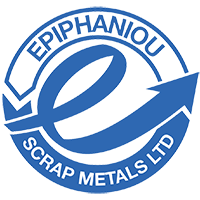At Epiphaniou Scrap Metal, we’re all about turning one company’s waste into another company’s metal supply. Today industrial metal recycling has become progressively more challenging as new products turn up in increased levels of complexity. Common commodity metals like steel are easy to recover given that their use in relatively simple applications. On the other hand, electrical and electronic waste can often have up to 50 recyclable elements.
Since we understand that recycling metal at your company is driven by the value of the metals recovered, we thought it would be a good idea to lay out some key considerations to help you optimize its value.
INDUSTRIAL METAL RECYCLING USING PRACTICES
Separating Metal Streams
Simple metal sorting consists of separating ferrous from non-ferrous metals. However, in mixed streams that involve non-ferrous metals, you will want to consider having the most efficient process for keeping streams homogenous and the best storage facility systems. For example, we have a supplier who manufactures wire and cable. They were mixing their waste stream of copper and tin. After consulting with us, they put systems into place to separate their copper and tin scrap and, as a result, gained a significant increase in their revenues from their metal waste stream. By putting the right filtering processes and storage systems in place, you will always get the best value for the metal you recycle.
Environment
The recycling of scrap metal protects the environment by conserving natural resources while contributing to the conservation of energy during processing of secondary metals. Another important aspect is the use of landfills. How much is your company paying each month for metal waste to go into a landfill? If you are not entirely sure that this kind of disposal is the right solution, then don’t hesitate to give us a call. We make sure that your metal waste streams turn into secondary revenue streams for your company. With the growing movement of environmental responsibility, your scrap metal recycling can attract more clients and open up opportunities with other companies who find these standards and values important.
Health & Safety
Most industrial processes involve risk; however, there are many potentially hazardous operations in scrap metal recycling. These include shredding, compacting, crushing, torching, shearing, breaking and separating, and the loading of heavy and sharp objects using heavy equipment. It is critical that employees and customers work in a safe environment. According to the director of safety at the Institute of Scrap Recycling Industries (ISRI), to cultivate a culture of safety, management needs to set meaningful and measurable safety goals.
Sustainability Matters
It’s important to remember that manufacturing and recycling are mutually beneficial to each to other. Necessity is the mother of invention, which rings true in the case of General Motors (GM). After risking bankruptcy and having to work through a major company restructuring, what emerged from the ashes was a zero-waste manufacturing policy. In GM’s plants across the globe, 90% of the manufacturing waste stream is re-used or recycled. In 2013, their revenues increased by over $1 billion when they implemented their zero-waste policy. It is now quickly becoming a standard for many manufacturers worldwide.
Whether your company generates soft metal scrap on a consistent basis or you require assistance with disposing of some old metal products, we offer custom solutions to your situation. Don’t hesitate to contact us.


